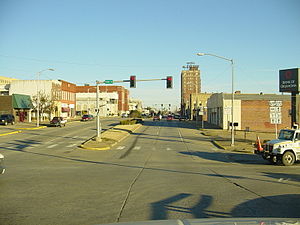Portal:Oklahoma
Portal maintenance status: (June 2018)
|
 Oklahoma (/ˌoʊkləˈhoʊmə/ OHK-lə-HOH-mə; Choctaw: Oklahumma, pronounced [oklahómma]) is a state in the South Central region of the United States. It borders Texas to the south and west, Kansas to the north, Missouri to the northeast, Arkansas to the east, New Mexico to the west, and Colorado to the northwest. Partially in the western extreme of the Upland South, it is the 20th-most extensive and the 28th-most populous of the 50 United States. Its residents are known as Oklahomans and its capital and largest city is Oklahoma City. The state's name is derived from the Choctaw words okla, 'people' and humma, which translates as 'red'. Oklahoma is also known informally by its nickname, "The Sooner State", in reference to the Sooners, American settlers who staked their claims in formerly American Indian-owned lands until the Indian Appropriations Act of 1889 authorized the Land Rush of 1889 opening the land to settlement. With ancient mountain ranges, prairie, mesas, and eastern forests, most of Oklahoma lies in the Great Plains, Cross Timbers, and the U.S. Interior Highlands, all regions prone to severe weather. Oklahoma is at a confluence of three major American cultural regions. Historically, it served as a government-sanctioned territory for American Indians moved from east of the Mississippi River, a route for cattle drives from Texas and related regions, and a destination for Southern settlers. There are currently 26. According to the 2020 U.S. census, 14.2 percent of Oklahomans identify as American Indians, the highest indigenous population by percentage in any state. A major producer of natural gas, oil, and agricultural products, Oklahoma relies on an economic base of aviation, energy, telecommunications, and biotechnology. Oklahoma City and Tulsa serve as Oklahoma's primary economic anchors, with nearly two-thirds of Oklahomans living within their metropolitan statistical areas. (Full article...) Template:/box-header
The University of Tulsa (TU) is a private research university in Tulsa, Oklahoma. It has a historic affiliation with the Presbyterian Church, although it is now nondenominational, and the campus architectural style is predominantly Collegiate Gothic. The school traces its origin to the Presbyterian School for Indian Girls, which was established in 1882 in Muskogee, Oklahoma, then a town in Indian Territory, and which evolved into an institution of higher education named Henry Kendall College by 1894. The college moved to Tulsa, another town in the Creek Nation in 1904, before the state of Oklahoma was created. In 1920, Kendall College was renamed the University of Tulsa. The University of Tulsa is classified among "R2: Doctoral Universities – High research activity". It manages the Gilcrease Museum, which includes one of the largest collections of American Western art and indigenous American artifacts in the world. TU also hosts the Tulsa Studies in Women's Literature, founded by former TU professor and noted feminist critic Germaine Greer (now at the University of Cambridge). (Full article...) McAlester is the county seat of Pittsburg County, Oklahoma. The population was 18,363 at the time of the 2010 census, a 3.4 percent increase from 17,783 at the 2000 census. The town gets its name from James Jackson McAlester, an early settler and businessman who later became lieutenant governor of Oklahoma. Known as "J. J.", McAlester married Rebecca Burney, the daughter of a full-blood Chickasaw family, which made him a citizen of the Chickasaw Nation. McAlester is the home of the Oklahoma State Penitentiary, the former site of an "inside the walls" prison rodeo that ESPN's SportsCenter once broadcast. The prison's nickname, Big Mac, was derived from its location in the town. (Full article...) The page "Portal:Oklahoma/box-header" does not exist. The page "Portal:Oklahoma/Selected picture/10" does not exist. Template:/box-header Template:/Featured content Template:/box-header Template:/State facts Template:/box-header
Troyal Garth Brooks (born February 7, 1962) is an American country singer and songwriter. His integration of pop and rock elements into the country genre has earned him his immense popularity, particularly in the United States with success on the country music single and album charts, multi-platinum recordings and record-breaking live performances, while also crossing over into the mainstream pop arena. Brooks is the only artist in music history to have released nine albums that were certified Diamond by the Recording Industry Association of America (surpassing The Beatles' former record of six); those albums are Garth Brooks (diamond), No Fences (17× platinum), Ropin' the Wind (14× platinum), The Chase (diamond), In Pieces (diamond), The Hits (diamond), Sevens (diamond), Double Live (21× platinum), and The Ultimate Hits (diamond). Since 1989, Brooks has released 27 records in all, which include 17 studio albums, two live albums, three compilation albums, three Christmas albums, and four box sets, along with 77 singles. He has won several awards in his career, including two Grammy Awards, 17 American Music Awards (including "Artist of the '90s") and the RIAA Award for best-selling solo albums artist of the century in the U.S. (Full article...) Template:/box-header Lua error in Module:Selected_recent_additions at line 69: bad argument #1 to 'gmatch' (string expected, got nil). The following are images from various Oklahoma-related articles on Wikipedia.
Template:/box-header Template:/Related portals Template:/box-header Template:/Wikiprojects Template:/box-header Template:/Things you can do Template:/box-header Template:/Categories The following Wikimedia Foundation sister projects provide more on this subject:
Discover Wikipedia using portals |






















